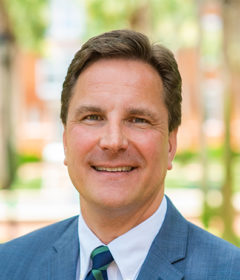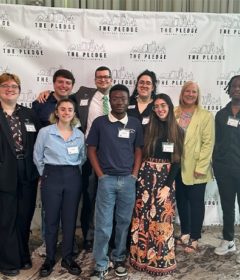A Growing Appetite for Fresh, Sustainable Food
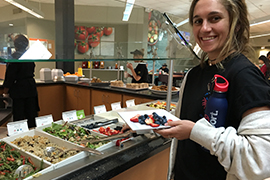
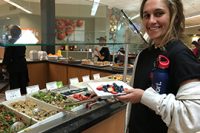
Stetson University student Alaska Gilmour comes from a family of body-builders in Zimbabwe and all of them strive to eat healthy.
Gilmour said she likes all the fresh fruits and vegetables in the Commons dining hall. It’s a welcome change from the boarding school that she attended back home where “if you didn’t like the food, tough,” she said, while scooping up fresh strawberries and blueberries from the Commons’ salad bar.
“Having this much choice is nice,” said Gilmour, a first-year student majoring in fine arts and psychology. “Eating healthy is a priority to me.”
Stetson Dining increasingly is serving up food with environmental responsibility and sustainability in mind. Thirty-two percent of the produce is grown locally, ensuring fruits and vegetables are fresh, and also requiring less gas to deliver them. Seafood comes from sustainable sources, instead of threatening global fish supplies, and meats and dairy products come from farms that treat animals humanely, and don’t use growth hormones or unnecessary antibiotics, according to Lua Hancock, Vice President of Campus Life and Student Success at Stetson.
Hancock, Stetson Dining staff, students, faculty and others convened last semester for the first-ever Food Forum, exploring ways to build on these efforts, such as providing more locally grown produce and reducing the amount of food waste that goes into the landfill. The group plans to keep meeting each semester to increase sustainability and reduce the carbon footprint of a dining service that serves about 20,000 meals a week in the Commons, Einstein Brother’s Bagels, Johnny Rockets and the Coffee Shop.
“One of the good things about Stetson is that the students are so intertwined with how much they love the environment,” said Lindsey Bishop, Director of Marketing & Guest Experience for Stetson Dining. “It’s something that’s big and they want to do more, so we’re trying to push forward and do more than the average campus might want to do.”
Stetson Professor Tony Abbott, who participated in the Food Forum, said good food shouldn’t just mean tasty and nutritious. It should also take into account other factors.
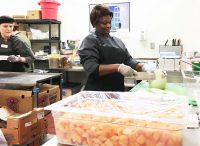
“My hope for the Food Forum is for people to think critically about what ‘good food’ means,” Abbott, a professor of Environmental Science at Stetson, wrote in an email. “This may mean giving special attention to any or all of several factors, such as labor practices, ecological footprint, nutrition, and the distance traveled. Each of us may prioritize these differently. The forum allows us to articulate our values through our most basic need, food and water.”
At the heart of the effort is ensuring fresh, healthy food for students and guests, said Bishop with Stetson Dining.
“Our food is fresh. That’s something that is a common misconception that everything is pulled out of a freezer and plopped down, and it certainly isn’t,” she said.
That will become evident when the Carlton Union Building renovation and expansion is completed next year, she said. The new Commons will have glass walls allowing diners to see into the food preparation areas. Only the dishwashing area will be out of view.
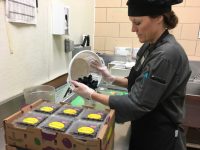
“You’ll be able to see them chopping fresh watermelon, chopping fresh vegetables,” Bishop explained. “That happens every single day, all day long, and I think it will open up our guests’ eyes to say that, okay, actually this is very fresh, especially with this generation which wants fresh, customizable meals.”
Stetson Dining already has undertaken a number of steps to ensure fresh food and become more environmentally friendly.
Its food distributor, Tampa-based Weyand, buys as much produce close to its facility as it can, including peppers, cucumbers, squash and tomatoes. That means Stetson gets fresh produce from farms that are approximately 130 miles from the DeLand campus. Last academic year, 32 percent of fresh produce came from these farms, and already more local farms are being added, Bishop said.
Stetson Dining uses as much recyclable items as possible. Students, faculty and staff are encouraged to bring their own cups to buy coffee and drinks, instead of using a disposable cup every time. People who purchase beverages with reusable cups at the Coffee Shop or at Einstein Brother’s Bagels can save a $1 off the price of beverages up to 32 ounces.
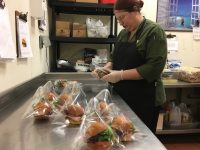
Stetson Dining also uses a program called Trim Trax to reduce food waste. When workers cut up fresh fruit and vegetables, they put the peelings and other waste into buckets, which get weighed and tracked, ensuring as much of the food is used as possible.
When the renovated Commons opens next year, it will include a pulper, a machine that “dramatically” reduces waste going to the landfill by mixing together all food waste and then extracting the water, said Stetson student Sarah Coffey, an Environmental Sustainability Fellow in the Center for Community Engagement. This will reduce waste from 12 bags of garbage to one bag.
Bishop said sustainability means “reducing the carbon footprint on how far things travel, and reducing food waste is definitely key.” That means reducing waste in the kitchen and also from diners, who are encouraged not to take more food than they can eat.
“With food waste, you’re reducing the amount of carbon monoxide you’re putting into the environment. It’s not going in the landfill,” she said. “A lot of this is just education. And a part of our job is to make sure the community is educated about sustainable food practices.”
-Cory Lancaster

